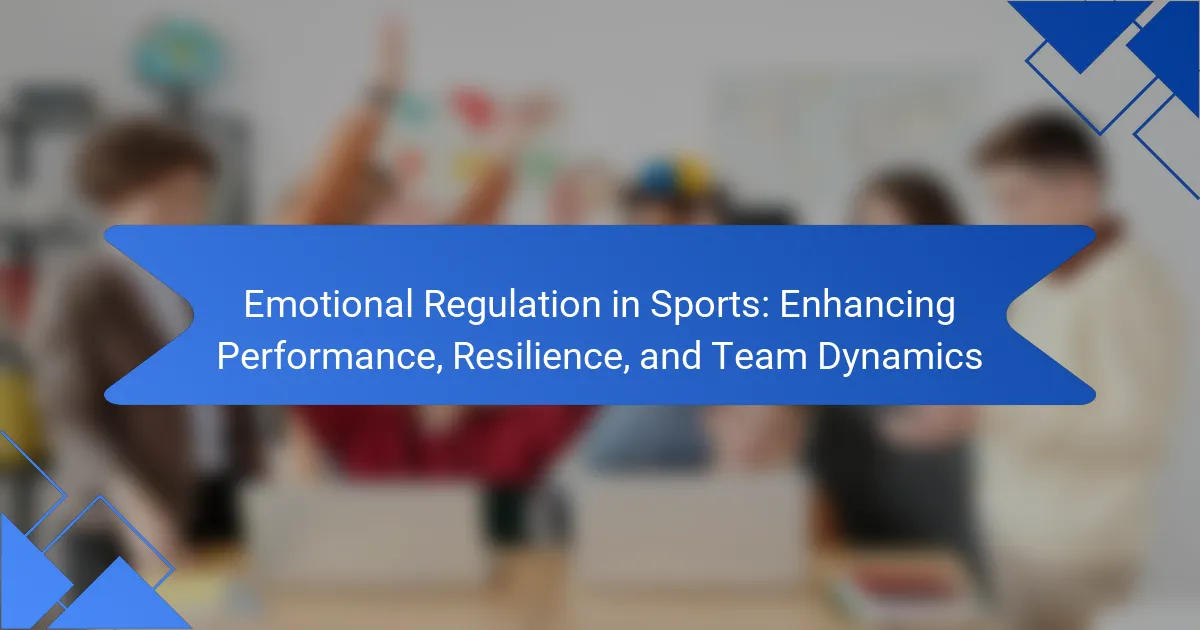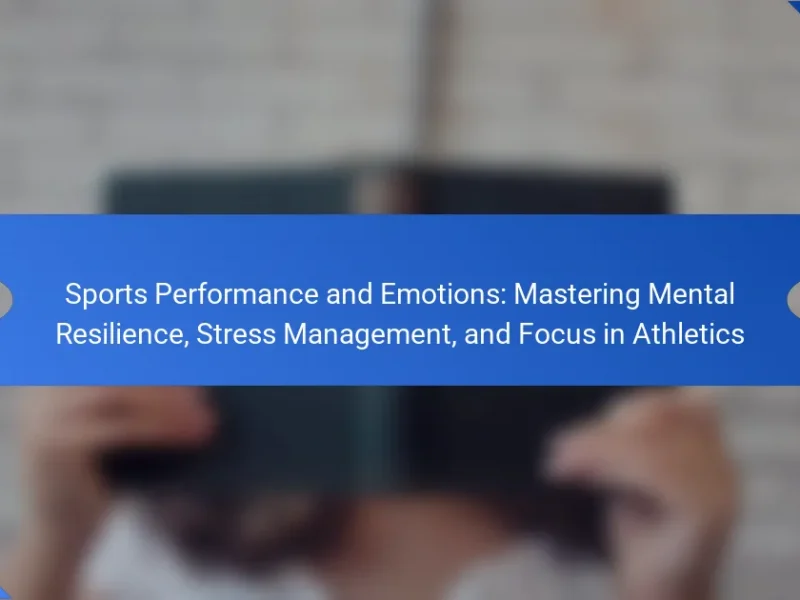Emotional regulation in sports is crucial for enhancing performance, resilience, and team dynamics. Athletes can improve focus and reduce anxiety through effective emotional management strategies. Key aspects include awareness of emotions, coping strategies, and the role of team culture. Additionally, intentional practices like mindfulness and cognitive restructuring can strengthen emotional regulation, benefiting both individual athletes and their teams.

What is Emotional Regulation in Sports?
Emotional regulation in sports involves managing emotions to enhance performance, resilience, and team dynamics. Athletes who effectively regulate their emotions can maintain focus, reduce anxiety, and improve overall performance. Research indicates that emotional regulation strategies, such as mindfulness and cognitive reappraisal, significantly contribute to athletes’ resilience during high-pressure situations. Additionally, strong emotional regulation fosters better team dynamics, promoting communication and collaboration among team members.
How does emotional regulation impact athletic performance?
Emotional regulation significantly enhances athletic performance by improving focus, resilience, and team dynamics. Athletes who manage their emotions effectively can maintain optimal performance under pressure. Research shows that emotional regulation strategies, such as mindfulness and cognitive restructuring, lead to better concentration and reduced anxiety during competitions. This results in improved decision-making and performance consistency. Additionally, effective emotional regulation fosters stronger team cohesion, as athletes communicate better and support one another during high-stress situations.
What role does emotional regulation play in resilience?
Emotional regulation significantly enhances resilience in sports by allowing athletes to manage stress and maintain focus. Effective emotional regulation helps athletes recover from setbacks and adapt to challenges. It fosters a positive mindset, which is crucial for peak performance. Research shows that athletes with strong emotional regulation skills demonstrate higher resilience, leading to improved team dynamics and individual performance.
How does emotional regulation influence team dynamics?
Emotional regulation significantly enhances team dynamics by fostering communication and collaboration. Teams with members skilled in emotional regulation experience improved conflict resolution, leading to higher performance. This skill promotes resilience, enabling teams to adapt to challenges effectively. Research shows that emotionally regulated teams report greater cohesion and satisfaction, ultimately driving success in sports environments.
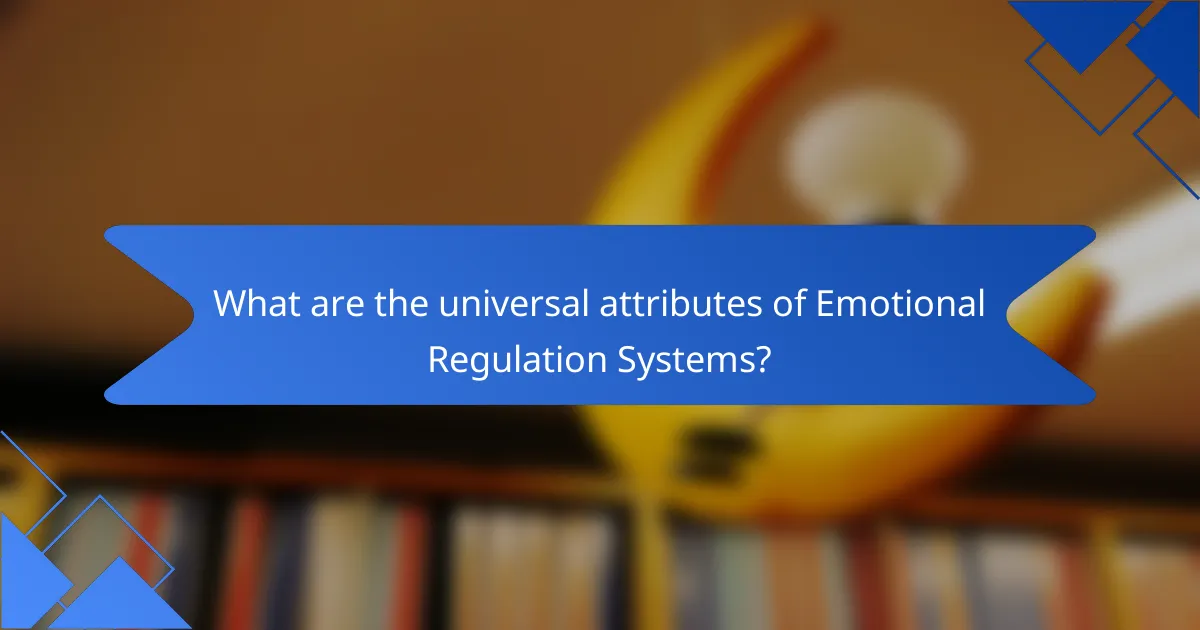
What are the universal attributes of emotional regulation systems?
Emotional regulation systems share universal attributes that enhance performance and resilience in sports. Key attributes include awareness of emotions, cognitive appraisal, coping strategies, and physiological regulation. These elements work together to manage emotional responses, fostering better team dynamics and individual performance.
What techniques are commonly used for emotional regulation in sports?
Common techniques for emotional regulation in sports include mindfulness, cognitive restructuring, and self-talk. Mindfulness enhances awareness and acceptance of emotions, promoting focus. Cognitive restructuring helps athletes reframe negative thoughts, fostering resilience. Self-talk involves using positive affirmations to boost confidence and manage anxiety. These techniques support performance and improve team dynamics.
How do athletes typically develop emotional regulation skills?
Athletes typically develop emotional regulation skills through targeted training, mindfulness practices, and supportive coaching. These methods enhance their ability to manage stress and maintain focus during competition.
Training programs often incorporate techniques such as cognitive-behavioral strategies, which help athletes recognize and alter negative thought patterns. Mindfulness practices, including meditation and breathing exercises, promote self-awareness and emotional control.
Supportive coaching plays a crucial role in fostering a positive environment. Coaches who encourage open communication and emotional expression help athletes build resilience and team dynamics. As a result, athletes become more adept at handling pressure, improving overall performance.
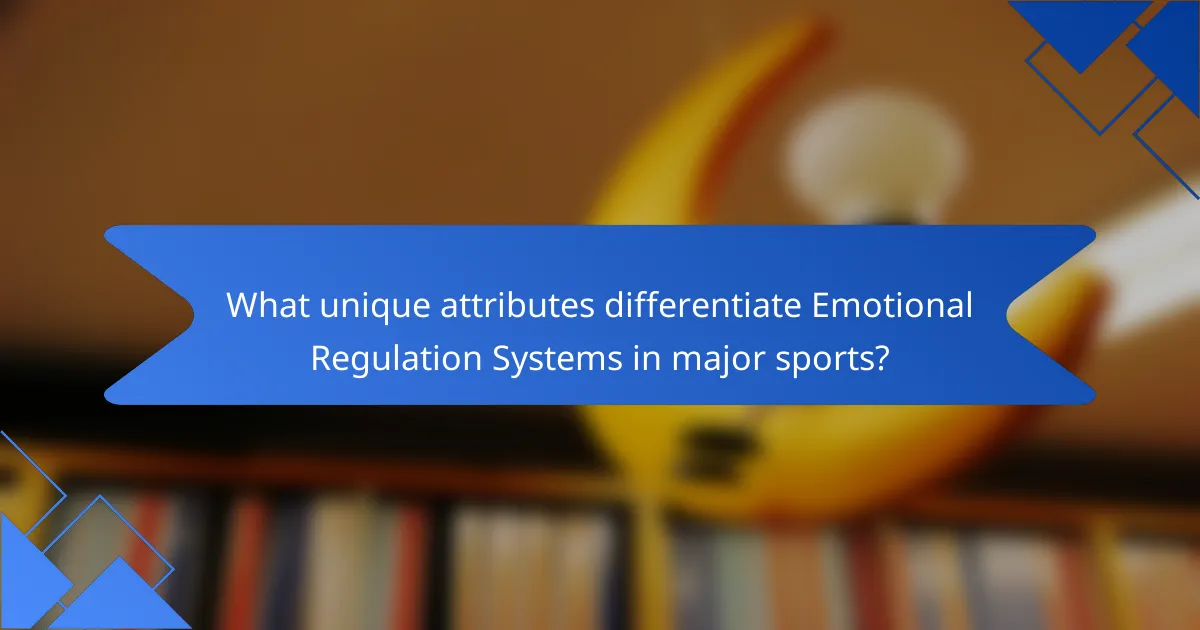
What unique attributes differentiate emotional regulation systems in major sports?
Unique attributes that differentiate emotional regulation systems in major sports include the specific strategies employed, the role of coaching styles, and the impact of team culture. For example, sports like basketball emphasize quick emotional responses, while sports like golf focus on prolonged concentration and self-control. Coaching styles vary significantly; some coaches prioritize mental resilience training, while others focus on emotional expression. Team culture plays a crucial role, as cohesive teams often develop unique emotional regulation techniques that enhance overall performance and resilience.
How do specific sports cultures shape emotional regulation practices?
Sports cultures significantly influence emotional regulation practices, impacting performance and team dynamics. Different sports emphasize distinct values, which shape how athletes manage emotions. For instance, team sports often foster collaboration and collective emotional regulation, enhancing resilience. Individual sports may promote self-reliance, leading to unique coping strategies. Cultural norms within sports dictate acceptable emotional expressions, affecting how athletes respond to stress and adversity. Understanding these dynamics can enhance training programs, tailoring emotional regulation strategies to specific sports contexts. This approach ultimately improves athletes’ mental resilience and overall performance.
What are the unique challenges faced by athletes in high-pressure situations?
Athletes in high-pressure situations face unique challenges that impact their emotional regulation and performance. These challenges include heightened anxiety, fear of failure, and intense scrutiny from coaches and fans. Emotional regulation becomes crucial as athletes must manage their responses to stress, maintaining focus and composure. Additionally, the pressure can lead to a decline in team dynamics, as individual stress may affect collaboration and communication. Developing resilience through mental training techniques can mitigate these challenges, enhancing overall performance and team cohesion.

What rare attributes exist in emotional regulation systems?
Emotional regulation systems in sports exhibit rare attributes like adaptability, which enhances athletes’ responses to stress. These systems also demonstrate emotional granularity, allowing for nuanced emotional experiences that improve decision-making under pressure. Another rare attribute is interoceptive awareness, enabling athletes to recognize internal emotional states, thus fostering resilience.
How do elite athletes utilize advanced emotional regulation strategies?
Elite athletes employ advanced emotional regulation strategies to enhance performance, resilience, and team dynamics. Techniques such as mindfulness, cognitive restructuring, and visualization help them manage stress and maintain focus. For example, mindfulness allows athletes to stay present during competition, reducing anxiety and improving decision-making. Cognitive restructuring helps them reframe negative thoughts, fostering a positive mindset. Visualization techniques enable athletes to mentally rehearse successful performances, boosting confidence and preparedness. These strategies collectively contribute to optimal performance and stronger team cohesion.
What uncommon emotional regulation techniques are gaining traction in sports?
Mindfulness meditation, visualization techniques, and breath control are uncommon emotional regulation techniques gaining traction in sports. These methods enhance focus, reduce anxiety, and improve overall performance.
Mindfulness meditation helps athletes maintain present-moment awareness, fostering resilience under pressure. Research indicates that athletes practicing mindfulness report lower stress levels and improved concentration.
Visualization techniques enable athletes to mentally rehearse their performance, leading to increased confidence and reduced pre-competition anxiety. Studies show that successful athletes often use visualization to enhance their skills and prepare for challenges.
Breath control techniques, such as diaphragmatic breathing, help regulate physiological responses to stress. Athletes employing these techniques experience better emotional control and improved recovery times.
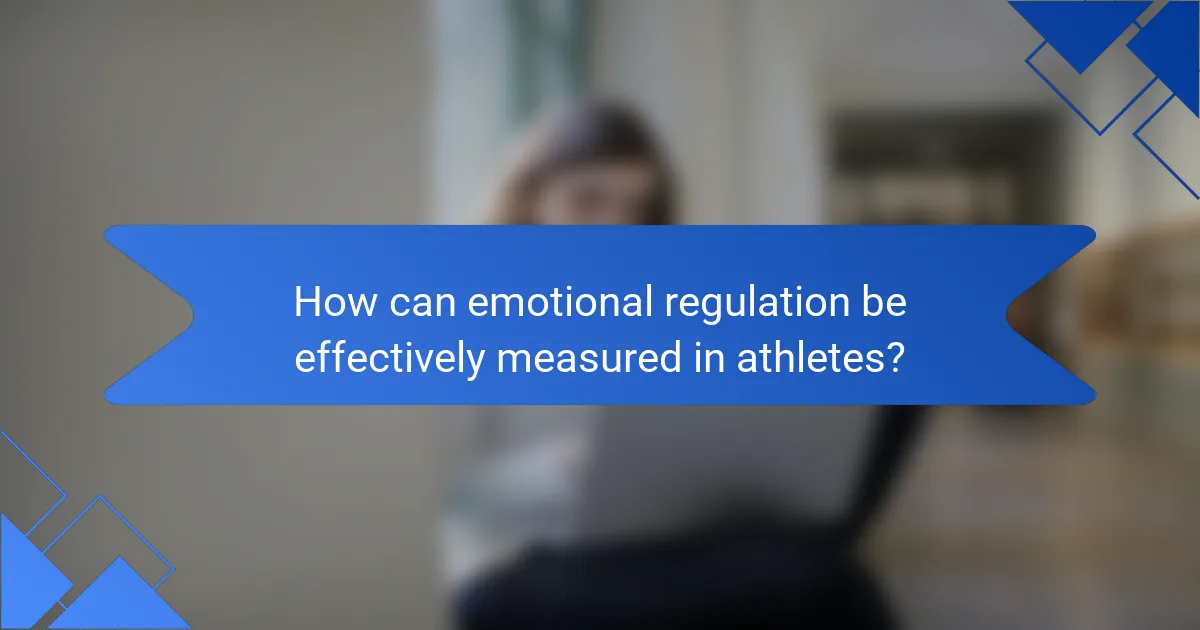
How can emotional regulation be effectively measured in athletes?
Emotional regulation in athletes can be effectively measured through self-report questionnaires, physiological assessments, and behavioral observations. Self-report tools, like the Emotion Regulation Questionnaire, gauge athletes’ awareness and management of emotions. Physiological assessments, such as heart rate variability, provide objective data on emotional responses. Behavioral observations, including performance under pressure, reveal how emotional regulation impacts outcomes. Integrating these methods offers a comprehensive view of emotional regulation’s role in enhancing performance and resilience.
What tools and assessments are available for evaluating emotional regulation?
Various tools and assessments are available for evaluating emotional regulation in sports, including self-report questionnaires, performance assessments, and physiological measures. Self-report tools like the Emotion Regulation Questionnaire assess athletes’ strategies for managing emotions. Performance assessments focus on behavioral responses during competition, while physiological measures track stress responses through heart rate variability. These tools enhance understanding of emotional dynamics, resilience, and team interactions.

What are the best practices for enhancing emotional regulation in sports?
Emotional regulation in sports can be enhanced through intentional practices. Key strategies include mindfulness training, cognitive restructuring, and emotional awareness exercises. Mindfulness helps athletes stay present and reduce anxiety. Cognitive restructuring allows athletes to reframe negative thoughts, promoting a positive mindset. Emotional awareness exercises enhance recognition of feelings, aiding in better response management. Coaches can foster a supportive environment to encourage open discussions about emotions, strengthening team dynamics and resilience.
What common mistakes do athletes make in emotional regulation?
Athletes often struggle with emotional regulation, leading to performance issues. Common mistakes include ignoring emotions, suppressing feelings, and not practicing mindfulness. Athletes may also fail to recognize triggers, leading to emotional outbursts during competition. Additionally, neglecting team dynamics can create tension, affecting overall performance.
How can coaches support athletes in developing emotional regulation skills?
Coaches can support athletes in developing emotional regulation skills through structured training and guidance. They can implement techniques such as mindfulness exercises, breathing strategies, and cognitive reframing to help athletes manage emotions effectively.
Regular feedback sessions can enhance self-awareness, allowing athletes to identify emotional triggers. Additionally, creating a safe environment encourages open discussions about feelings, promoting resilience and team dynamics. Coaches can model emotional regulation themselves, demonstrating healthy coping mechanisms during high-pressure situations.
Incorporating role-playing scenarios can provide practical experience in managing emotions during competition. This hands-on approach fosters adaptability and prepares athletes for real-world challenges. Ultimately, a comprehensive support system empowers athletes to enhance their performance and mental well-being.
What expert insights can enhance emotional regulation strategies for teams?
Expert insights can significantly enhance emotional regulation strategies for teams by fostering a culture of open communication, encouraging mindfulness practices, and implementing structured feedback mechanisms. Open communication allows team members to express emotions, reducing stress and promoting understanding. Mindfulness practices, such as meditation or breathing exercises, cultivate self-awareness and emotional control, improving overall team dynamics. Structured feedback mechanisms, including regular check-ins or performance reviews, help identify emotional challenges and provide support, enhancing team resilience and performance.
